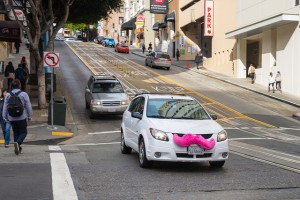Zipcar, Uber, Airbnb. These names are familiar to savvy consumers, but city officials have been slow to catch on to the sharing economy trend.
Now, a new report from the National League of Cities (NLC) says cities are serving as laboratories for these ever-changing technologies and business models, and they might as well get used to the idea.
The report, entitled “Cities, the Sharing Economy and What’s Next,” provides an analysis of what’s happening in U.S. cities aimed at helping leaders better understand, encourage and regulate the growing sharing economy.
The report notes that the sharing economy is thriving, upending traditional industries, disrupting local regulatory environments and serving as a benchmark for innovation and growth. “This is all happening at once, and there is no status quo; while emerging models are developing, the relative novelty of this issue precludes long-term, tested best practices,” it said.
Here are some key findings.
Think broader. Many policymakers often assume that the concept of the sharing economy applies only to ride sharing, made popular by Uber, Lyft and other app-driven various, and home sharing, the concept behind the phenomenally popular Airbnb.
But, there is a wide array of goods and services that can be shared, which range from food and beverages, to an individual’s time and tools, said the report. “Municipalities, for example, can even share heavy equipment, reducing overall expenditures and providing needed tools that might otherwise have been unavailable.”
Adapt regulations. There is no “one-size-fits-all” regulatory framework that every locality can or should apply to the influx of new economic activity. The landscape requires cities to experiment and develop unique, locally driven solutions to new challenges.
Unlike other emerging city issues, the patterns of diffusion across the country do not necessarily present themselves along the traditional lines of city size or region.
States are also playing a significant role in the emergence of the sharing economy, often intervening in a manner that includes legislation, regulatory rulings and even legal action.
Different approaches. The report looks at the ways a series of cities have dealt with the sharing economy. Indianapolis has embraced the “big tent” idea, welcoming any business that might positively impact the city and its residents to pilot their product, said the report. A city official explained that beyond “a good faith discussion and engagement around safety,” the city does not want to impede a thriving platform built around a good idea and sophisticated data from doing what it does best.
Portland, Oregon, however, has found there is little research reflecting whether the sharing economy actually increases tourism, or whether it is simply diverting people and money away from traditional service providers such as hotels and taxis.
City officials interviewed in the report agreed it was important to work not only with companies involved in the sharing economy, but also with those that provide comparable services in more traditional roles. This will ensure that the playing field is leveled, and, when applicable, legislation is updated so that everyone can benefit.
City leaders must walk a fine line, working to embrace change and innovation while simultaneously prioritizing safety and developing context-sensitive city solutions that work for their community.
“There is great promise with the rapid ascent of sharing economy services in our nation’s cities, and the best thing that city policymakers can do is keep an open mind about how the new economy might be fruitful with the right regulatory framework in place – because sharing is here to stay,” said the report.
For story ideas, look at how cities and counties are handling different aspects of the sharing economy, from Airbnb, to Uber, and all their variations.
STORY IDEAS
Cities, the Sharing Economy and What’s Next
National Association of Counties
TechCrunch: The Sharing Economy Is On The Brink Of Disrupting Business Travel











